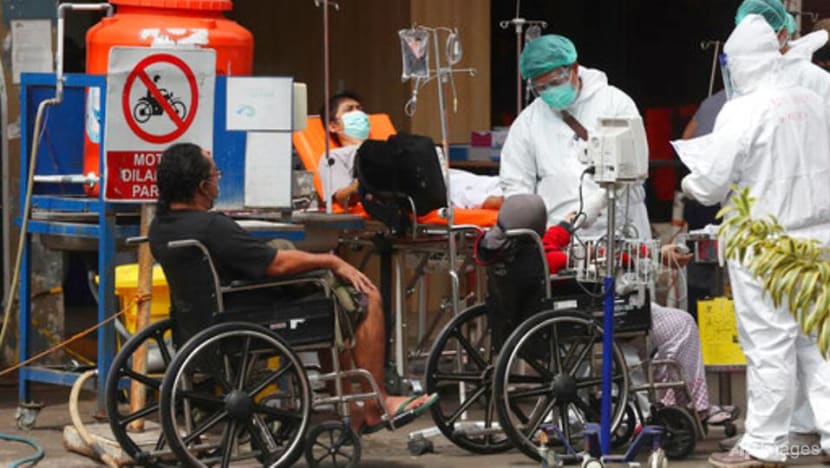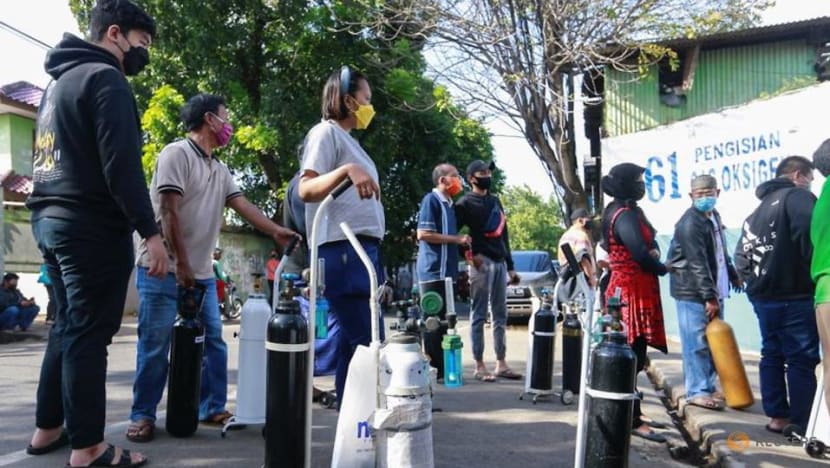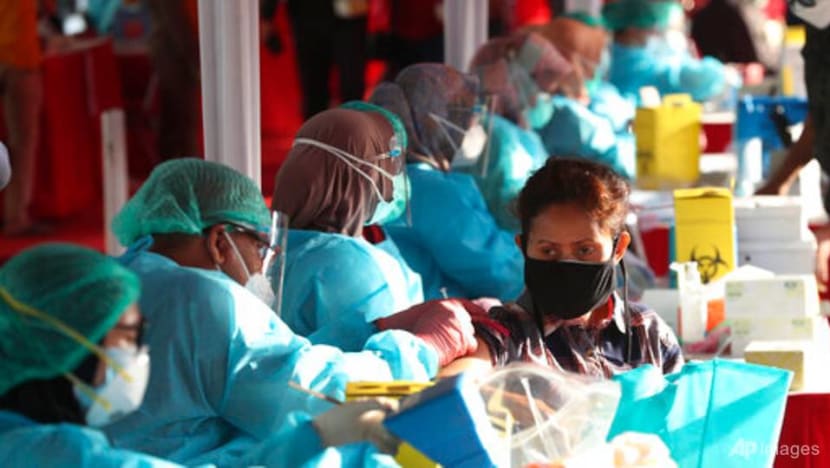'Very possible' for Indonesia's broad emergency COVID-19 curbs to be extended beyond Jul 20: Minister

Paramedics tend to people at an emergency tent erected to accommodate a surge of COVID-19 patients at a hospital in Bekasi on the outskirts of Jakarta, Indonesia, Saturday, Jul 10, 2021. (Photo: AP/Achmad Ibrahim)
JAKARTA: Indonesia's coordinating minister for maritime affairs and investment Luhut Pandjaitan said on Friday (Jul 16) that it is very possible for broad emergency community restrictions to curb the spread of COVID-19 to be extended, as cases continue to spike.
Indonesia is currently imposing so-called Emergency Implementation of Public Activity Restrictions or PPKM Emergency on the islands of Java and Bali, as well as 15 other cities. The curbs, in place since Jul 3, are scheduled to end on Jul 20.
Speaking at a press briefing for foreign media on Friday, Mr Pandjaitan said it is “very possible that we will extend” PPKM Emergency but added that the government is still mulling over the matter.
“I don’t think within two weeks we can reduce, control this Delta variant,” he said, referring to a more transmissible variant of the coronavirus which has caused cases to spike.
Mr Pandjaitan had been appointed by President Joko Widodo to oversee the implementation of PPKM Emergency.
The minister said on Friday that the number of cases might flatten within two to three weeks after the PPKM Emergency is introduced because of the virus’ incubation period. However, Mr Pandjaitan admitted that “this is an optimistic view".
“We started (PPKM Emergency) on Jul 3. So, you just add 14 to 21 days. But you never know. This is an unpredictable variant.”
Mr Pandjaitan said that there is also a possibility that the PPKM Emergency will include more provinces and cities outside of Java and Bali.
“The issue right now we are facing is also outside of Java and Bali. The number of Delta variants in Lampung (province), Kalimantan (island) and West Nusa Tenggara (province) is also high. This is another issue that we have to tackle. We are not only thinking about Java but also outside of Java,” he said.

When asked if the PPKM Emergency will be extended to include more provinces, Mr Pandjaitan said that “anything is possible.”
For three days in a row, Indonesia has been recording more than 50,000 new COVID-19 cases daily.
Over the last seven days, Indonesia has recorded more than 320,000 COVID-19 cases with between 800 to 1,200 deaths reported every day. In total, the country has recorded 2.7 million COVID-19 cases, with more than 70,000 dead.
Mr Pandjaitan said on Thursday that the country is already grappling with a "worst-case scenario" COVID-19 situation, adding the government was preparing for a further climb in cases as the Delta variant continues to spread.
READ: Grappling with 'worst-case scenario', Indonesia faces more COVID-19 pain
READ: Volunteer ambulance drivers help take the strain on Indonesia's COVID frontline
Meanwhile, hospitals are said to be overwhelmed by the surge in COVID-19 patients.
In a separate press conference on Friday, religious minister Yaqut Cholil Qoumas said there are plans to convert 27 haj centres into COVID-19 hospitals and isolation facilities. The haj centres were originally used to house pilgrims from out of town before they travel to their religious pilgrimage to Saudi Arabia.
However, since Saudi Arabia has barred foreigners and non-residents from performing the haj, the centres have been empty.
The government has recently converted the haj centre in Jakarta into a temporary COVID-19 hospital. “We are ready to have our haj centres become part of the COVID-19 mitigation programme, both as hospitals or isolation facilities,” Mr Qoumas said.

IDUL ADHA RESTRICTIONS
The religious minister also urged Muslims not to travel to their hometowns to celebrate the Islamic holiday Idul Adha, the peak of the haj season, which will fall on Jul 20.
The annual exodus, known as mudik, he said “will further exacerbate the spread of COVID-19".
On Jul 4, the religious ministry issued a decree banning Muslims from performing communal Idul Adha prayers, which traditionally attract thousands of worshippers. The decree also banned celebrations on the eve of Idul Adha, known as takbiran. The occasion is traditionally marked by lighting firecrackers and parades.
“The decree is also banning all forms of takbiran parade as well as mass gatherings in mosques. We welcome people to perform takbiran at home,” Mr Quomas said.
Idul Adha is also marked by animal sacrifice and giving meat to the needy. “We will regulate animal sacrifices so that they are performed at slaughterhouses or open spaces and participants are limited to a handful of officials and donors,” he said.
“The practice of giving alms must not attract crowds as it is regularly done before the pandemic. We will make sure that alms are handed door-to-door to the needy.”
BOOKMARK THIS: Our comprehensive coverage of the COVID-19 pandemic and its developments
Download our app or subscribe to our Telegram channel for the latest updates on the coronavirus outbreak: https://cna.asia/telegram












